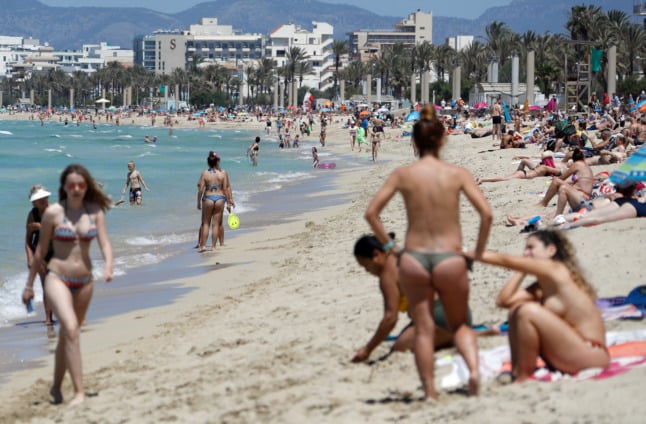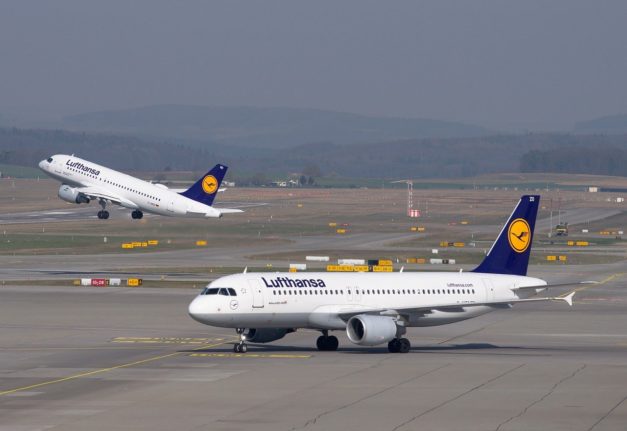Until now, popular regions of Spain such as the island of Mallorca had been held off the coronavirus risk list, making it relatively easy for German tourists to enjoy a trip there this summer.
But in light of soaring infection rates, the Robert Koch Institute (RKI) will now class the country a ‘risk area’ from Sunday, 11th July.
Although it means quarantine-free travel is still possible with proof of a negative Covid test, vaccination or recovery, travellers returning to Germany from Spain will have to register online – and the development of the situation will be watched more closely.
However, as of Friday, the nationwide 7-day incidence per 100,000 people had just snuck over the 200 mark to 201.1, up from 92 on July 2nd. The 14-day incidence, meanwhile, had shot up to 278.
READ ALSO:
- ‘Explosive transmission’: What you need to know about Spain’s fifth Covid wave
- ‘No need for return of state of alarm,’ Spain insists as Covid cases skyrocket
If it stays at these levels, there’s a chance that the country could be moved up the list once again and be reclassified ‘high incidence’ area.
This would mean anyone who isn’t vaccinated against or recovered from Covid would have to quarantine for at least five days (or a maximum of 10) after traveling to Germany.
Since April this year, the region of La Rioja has been on the Covid risk list, followed the regions of Ceuta, Catalonia (where Barcelona is) and Cantabria in June and July.
The Basque Country, Andalusia and Navarra have been classed as risk areas since last summer, though the Spanish islands have remained notably absent since they were scratched from the list in March.
Spike in infections in Mallorca
For a few weeks now, Mallorca’s status as a non-risk area has been out of step with reality.
While the island enjoyed consistently low infections between February and late June, the infection rate suddenly started to shoot up from June 26th – first over 50 (the RKI’s lower threshold for a basic risk area) and then over 100.
As of Thursday, the 7-day incidence of new infections per 100,000 people was 127,2 in Mallorca. Across the Balearic Islands as a whole – the archipelago that encompasses Mallorca, Menorca and Ibiza – the 7-day incidence was 157,1.
Meanwhile, the ‘R’ rate – meaning the number of other people infected by one person with Covid – stood at 2.1, suggesting that infections are set to continue to increase exponentially in the coming days and weeks.
Mallorca is often referred to as the 17th German state due to the overwhelming presence of German tourists there. It hit the headlines in March when tens of thousands of Germans travelled to the island over Easter at the peak of Germany’s third wave.
READ ALSO: What are the rules for travelling to some of Germany’s favourite holiday destinations?
If the 7-day incidence tops 200 in the coming weeks and Spain becomes a high-incidence area, people with no proof of vaccination or recovery will have to quarantine for 10 days on their return, with the option to end quarantine with a negative test after five days.
This could strike a major blow both to German holidaymakers and the island’s tourist economy.
Entry registration will be needed
Though everyone who travels by plane has to show a negative test or proof of vaccination or recovery before they fly, those who travel to ‘non-risk’ areas don’t have to register in Germany’s digital entry portal on their return, and there is no obligation to quarantine.
With the whole of Spain now considered a risk area, holidaymakers will be asked to register on the government’s entry portal in order to get back into Germany.
The government is also advising against unnecessary travel to the country, including tourist trips.
However, with the official travel warning to risk areas having been dropped by the government in early July, this ‘advice’ is likely to be a much softer deterrent to holidaymakers than the stronger official warning.
READ ALSO: EXPLAINED: How Germany’s latest rules on international travel affect you
Cyprus on the ‘high incidence’ list
As well as moving the entirety of Spain onto RKI’s list of risk countries, another holiday destination beloved by German tourists is now subject to much stricter travel rules.
With Covid infections rapidly on the rise, the Mediterranean island of Cyprus has been pushed up a level from a risk area to a high-incidence area and has therefore become subject to a travel warning.
The stricter rules will come into force on Sunday, July 11th.
As of Friday 2nd of July, the 7-day incidence in Cyprus was around 213, putting it in second place in Europe, just below the United Kingdom.
As mentioned above, countries with a 7-day incidence of more than 200 are classed as ‘high-incidence’ areas by the RKI, meaning registration is mandatory, and people who aren’t fully vaccinated or recovered must quarantine for at least five days after returning to Germany.
New Lambda variant arrives in Spain
Though Spain is (for now) only considered a ‘risk area’ rather than a high-incidence or virus variant area, one region of the country has recorded several cases of a highly infectious South American variant of Covid in recent days.
According to Spanish media sources, the Lambda variant – which was first discovered in Peru last year – has been linked to around 80 new Covid cases in the northern region of Cantabria.
With the variant also present in the United Kingdom, health experts fears that it could start to spread across Europe.
READ ALSO: Germany’s infection rate rises slightly as new Covid variant reaches Europe
With the Delta variant now becoming the dominant strain of Covid in Germany, the downward trend in the country’s infection rates has also started to reverse in recent days.
On Tuesday, the RKI recorded a 7-day national incidence of 4.9 – a figure which had increased to 5.5 by Friday.



 Please whitelist us to continue reading.
Please whitelist us to continue reading.
Member comments